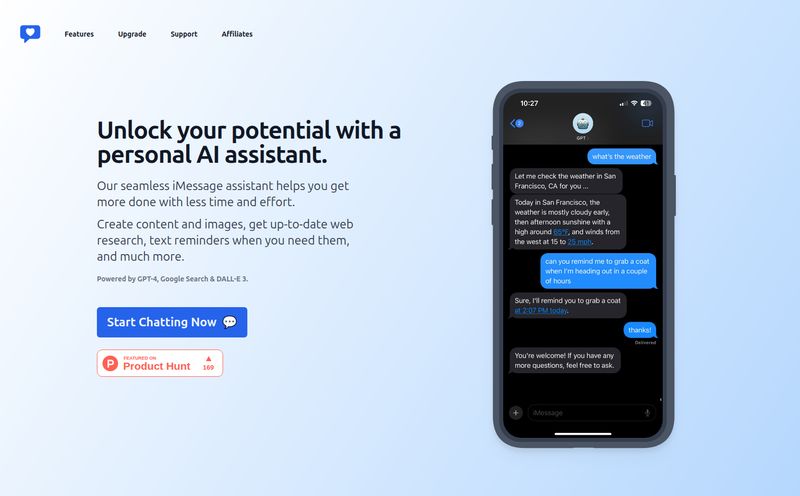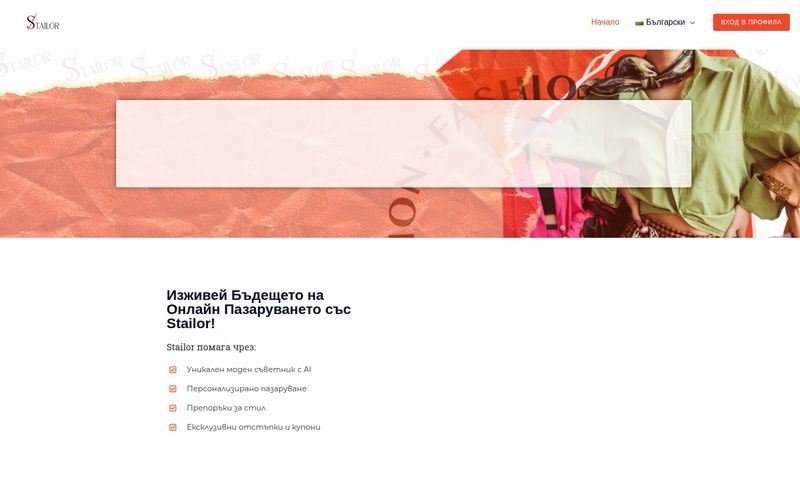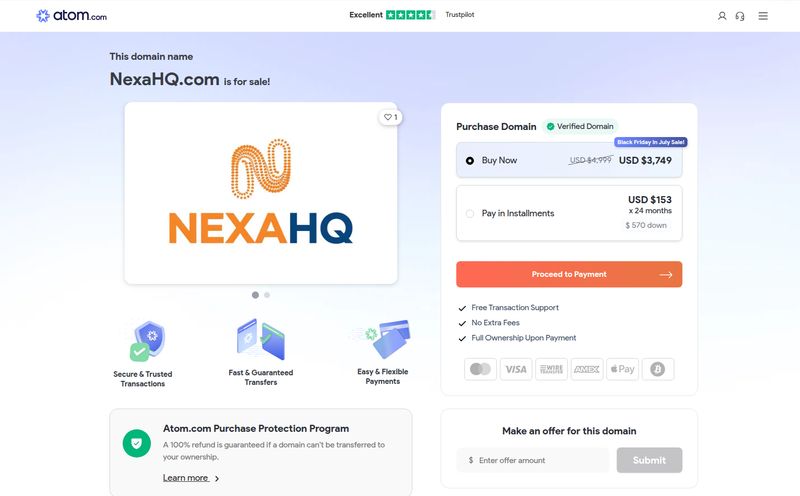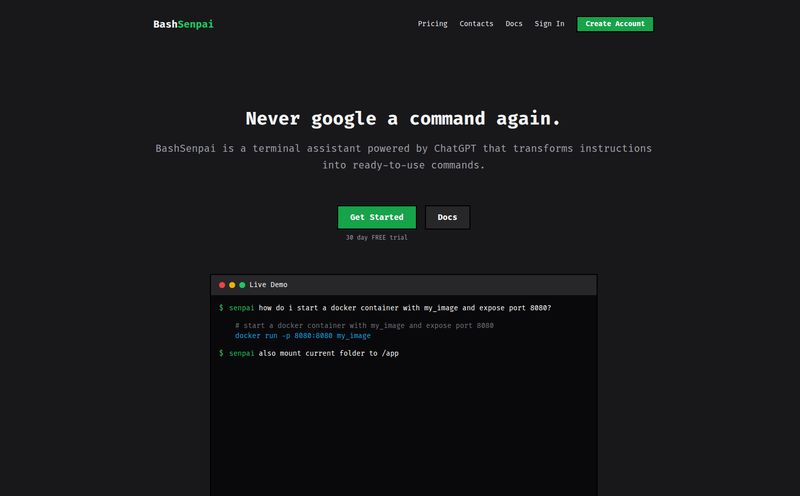We’ve all been there, or know someone who has. When you lose someone, there's this weird, surreal bubble of time. People bring casseroles, they say the right things (and sometimes the very, very wrong things), and you’re just trying to breathe. But then the bubble pops. And what’s left isn’t just grief. It’s a mountain of paperwork. It's phone calls, account closures, legal jargon, and a to-do list that feels both impossibly long and deeply cruel.
For years, the 'solution' has been a patchwork of sympathetic HR managers, expensive lawyers, and frantic late-night Googling. I’ve seen it cripple productivity for employees and add immense stress to families already at their breaking point. So when I first heard about a platform named Empathy, my professional curiosity was definitely piqued. A tech solution for bereavement? It sounds a bit cold, doesn't it? But the more I looked into it, the more I realized it might just be the opposite.

Visit Empathy
So, What Exactly is Empathy?
At its core, Empathy isn't just an app; it's a comprehensive support system designed to hold a family's hand through the entire ordeal that follows a death. It’s not trying to replace human connection, but to handle the logistical nightmare so families can actually have the space to grieve. Think of it as a digital sherpa guiding you up that mountain of tasks. They partner with large organizations—think life insurance companies like Prudential and forward-thinking employers—to offer their services as a benefit. So for the end-user, the family, it's often available at no cost. Which is, frankly, a huge deal.
More Than Just a Sympathy Card: Breaking Down the Features
This is where it gets interesting. It’s not just one thing, but a suite of tools designed to tackle both the practical and emotional sides of loss.
The Practical Side: Taming the Paperwork Dragon
This is the part that, in my opinion, is a total game-changer. Anyone who’s had to act as an executor knows the pain. It’s a full-time job you didn’t apply for. Empathy steps in with time-saving tools to help automate and simplify tasks. We’re talking about help with closing accounts, navigating probate (the legal process of sorting out the will and estate), and managing all the documentation. They even provide access to a Dedicated Care Manager—a real human—to guide you through the muck. This isn't just about convenience; its about giving people back their time and mental bandwidth when they have none to spare.
The Human Side: Grief Support When You Need It
Okay, so the logistics are covered. But what about the actual, you know, grief? Empathy provides 24/7 access to grief support. This is critical. Grief doesn’t stick to a 9-to-5 schedule. That wave of sadness can hit you at 2 a.m. on a Tuesday. Knowing there's somewhere to turn, a resource that understands the complex, non-linear path of mourning, is incredibly powerful. It’s a far cry from the old-school Employee Assistance Programs (EAPs) that often feel impersonal and difficult to access.
The AI in the Room: The Obituary Maker
I have to admit, when I saw "AI Obituary Maker" my first thought was a bit... skeptical. An algorithm writing about a unique human life? It sounds a bit dystopian. But after thinking on it, I've softened. How many people, in the depths of sorrow, can sit down and write a beautiful, coherent tribute? It’s an agonizing task. The AI tool serves as a starting point, a way to structure your thoughts and get the difficult first draft on paper. You can then edit, personalize, and make it your own. It's not meant to replace the heart, just to help the hand get started. It’s a practical application of AI that, while maybe a little jarring at first, solves a very real, very painful problem.
The Big Question: How Much Does Empathy Cost?
Alright, you’ve been scrolling for the price tag, haven’t you? Here’s the interesting part: you probably won't find one on their site. Empathy operates primarily on a B2B2C model. That’s business-to-business-to-consumer, for those not drowning in marketing acronyms. This means they partner with large companies—employers, life insurance carriers, etc.—who then offer the Empathy platform as a benefit to their employees or policyholders. So, for the family in crisis, the service is usually free. It’s a brilliant strategy, positioning bereavement support as an essential part of a modern benefits package, right alongside health insurance and retirement plans.
A Look Through My SEO Goggles: Who is Empathy For?
From a trends perspective, Empathy is hitting the nail on the head. There's a growing conversation in the corporate world about mental health and holistic employee wellness. Companies are realizing that supporting an employee through a major life event like a death isn’t just compassionate—it’s good for business. An employee who is supported is more likely to be loyal, engaged, and able to return to full productivity sooner. Empathy’s target audience isn’t just the grieving family; it’s the CHROs, the benefits consultants, and the insurance executives who are looking for a meaningful way to provide real, tangible care.
| The Good | The Not-So-Good |
|---|---|
| A single, centralized platform for a chaotic process. It combines the practical with the emotional, which is rare and incredibly valuable. | Access is a bit of a lottery. Your ability to use it depends entirely on whether your employer or insurance provider has partnered with them. |
| Personalized care plans mean you're not getting a one-size-fits-all solution. Your journey is unique, and the support reflects that. | The reliance on AI for some features might not sit well with everyone. Some people may prefer a 100% human-led process, even if its less efficient. |
| The cost (often free for the end-user) removes a significant barrier to getting high-quality help during a crisis. | To get the most out of it, you have to share a lot of sensitive personal and financial information. That requires a big leap of faith. |
My Final Take: Is Empathy the Real Deal?
Yes. I think it is. It's one of those services that makes you say, "Why didn't this exist sooner?" It addresses a universal human experience with a solution that is both technologically smart and deeply human. It won't take away the pain of loss, nothing can. But it can lift the suffocating weight of the administration that comes with it. It gives families the most precious commodity of all: the time and space to just be with their grief, to remember, and to begin to heal. It’s a big step forward for employee benefits and a massive relief for anyone who has to walk this path.
Frequently Asked Questions about Empathy
- How do I get access to the Empathy platform?
- Empathy is typically provided as a benefit through an employer or a life insurance company. The best way to check if you have access is to contact your HR department or your insurance provider to see if they are a partner.
- Is my personal information safe with Empathy?
- This is a valid concern. Empathy states they are committed to information integrity and privacy. Like any platform handling sensitive data, they use security measures to protect your information. It's always a good idea to review the privacy policy of any service you use.
- What specific tasks can Empathy help me with?
- It can help with a wide range of administrative tasks, including closing financial accounts, stopping junk mail, managing digital subscriptions, navigating the probate process, and organizing important documents. The goal is to reduce your administrative burden significantly.
- Is the grief support from real people or bots?
- The grief support connects you with real, trained professionals. While the platform uses technology for organization and some features like the obituary builder, the emotional support component is human-to-human, available 24/7.
- Can Empathy completely replace a lawyer for probate?
- No, and this is an important distinction. Empathy provides probate assistance and guidance. It helps you understand the steps and manage the tasks. However, it does not provide legal advice and cannot replace an estate attorney for complex legal matters or court filings. Think of it as a powerful paralegal and project manager for the process.
- How is this different from a standard Employee Assistance Program (EAP)?
- While EAPs offer general counseling, Empathy is highly specialized for bereavement. It combines dedicated grief counseling with practical, logistical tools for estate administration, a combination you won't typically find in a generalist EAP.
Conclusion
Navigating loss will never be easy. It's a fundamental, messy, human process. But the administrative chaos that we've all come to accept as part of it doesn't have to be. Platforms like Empathy are challenging that assumption. By blending smart technology with genuine human compassion, they are creating a new standard for bereavement care. It’s a quiet revolution, but for the families it helps, the impact is anything but.



